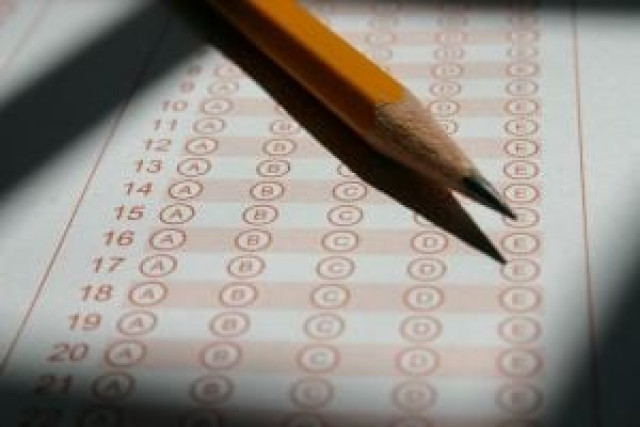Fair play?: Govt schools register poor performance in SSC results
Many accuse private institutes, parents of bribing education board officials, teachers.

The PTI leader also alleged private schools had taken the shape of a mafia and paid bribes to ensure good results PHOTO: FILE
Several billboards advertising private schools have sprung up in Shabqadar Bazaar of Charsadda district, boasting of students who achieved more than 900 marks in their Secondary School Certificate (SSC), Matric exams.
The glossy adverts are meant to convince parents to enrol their children in private schools because of their extraordinary results. However, many in the education sector believe the glitter is far from gold.
Advocate Irshad Khan, a Pakistan Tehreek-e-Insaf (PTI) leader is suspicious of the tall claims. He questions how a student can obtain 1,000 marks out of a total of 1,050. “The cheating culture is so prevalent in our education system; these students get high marks in board exams, but they fail in entry tests organised by proper testing authorities.”

Irshad claimed the immoral practice had ruined the entire academic system. “It is because of negligence on part of government school teachers. Instead of performing their actual duties, they prefer election, invigilation and polio duties,” he alleged.
The PTI leader also alleged private schools had taken the shape of a mafia and paid bribes to ensure good results. “They spend huge amounts of money during exams to ensure enrolled students get good grades.”
He claimed the schools have connections with the education board’s administration which is why the latter does not take any action against them even if they are found violating court orders regarding the sibling policy which makes it mandatory for schools to charge half the fees for siblings of a student.
“There is a certain mafia of school teachers who always invigilate in some private schools,” said Irshad, implying teachers also take bribes to help students cheat.
The owner of a private school, Hazrat Shah Paracha claimed a teacher invigilating in his school had taken Rs30,000 as bribe from a student during a practical exam. “I am trying to submit an application to the National Accountability Bureau (NAB) regarding this [but] I’m afraid the teacher may go unpunished as he has connections in the Peshawar board,” said Paracha.
Talha, a private school student who secured over 900 marks in the SSC exams, said all education boards in the province are competing to have the highest scoring students from their jurisdiction. “After the creation of several boards, the ratio of passing marks keeps increasing. Every board’s official wants his own area to benefit,” he said.
Imdad Ali Shah, a public school teacher, said the reason government school students did not get good marks, is that a majority of them cannot afford to pay visiting invigilators.
“When I was on exam duty in a government school, I made no money. However, a friend of mine served at a private school and made Rs70,000. Both the administration and the students’ parents paid him,” claimed Imdad.
Yasir Khan, a student of a government college, said when he appeared for exams at a public school, cheating was not permitted. But when he went with his younger brother the next year, he found out that by paying Rs500 to the school’s administration, his brother was allowed to cheat in the paper.
In the recently held Peshawar Board’s SSC exams, only a female student – Khushbu Innayat from Government Girls High School Mian Gujjar – succeeded in getting third position in the arts group. The rest of the top twenty positions were clinched by private school students.
Published in The Express Tribune, June 18th, 2013.













COMMENTS
Comments are moderated and generally will be posted if they are on-topic and not abusive.
For more information, please see our Comments FAQ